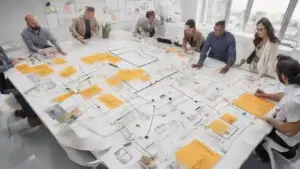

Sarah’s been your healthcare studio director for 22 years. She knows every quirk of OSHPD requirements, can spot a problematic patient flow pattern from across the room, and has relationships with half the hospital administrators in the state.
Last month, she mentioned maybe retiring in three years. Your stomach dropped.
However, here’s what I’ve discovered after speaking with dozens of firm principals: Sarah is already leaving. Every. Single. Night.
I was sitting with a managing principal in Chicago last month when he said something that stopped me cold: “We don’t have employees. We have knowledge rentals that reset every morning.”
He’s right. We’ve built an entire industry on the assumption that expertise stays put. That our best people will always be there when we need them. That knowledge somehow transfers through proximity and time.
It’s a comforting lie I believed, too. Until I saw what’s actually possible.
Here’s what fascinated me when I studied Sarah’s role: It’s not what she knows – it’s how she knows.
She doesn’t just know healthcare codes. She knows that when a client says “patient-centered design,” they mean three completely different things depending on whether they’re the CEO, the nursing director, or the facilities manager. She knows which consultants will actually deliver on aggressive schedules and which ones just talk a good game.
I watched her handle a tricky program pushback. She didn’t argue in the kickoff meeting. She waited three weeks, built trust, then reframed the issue so naturally the client thought it was their idea. Twenty years of pattern recognition in a 15-minute conversation.
Try putting that in a procedures manual.
I’ll admit – I was skeptical when a firm principal told me he’d “immortalized” his expertise. The phrase felt like tech hype. Then I witnessed something that shifted my entire view.
His digital twin was handling a complex code review while he was on vacation in Greece. The junior staff asking questions had no idea. The responses weren’t just accurate – they sounded exactly like him. Same reasoning patterns. The same way to catch issues before they become problems. The same gentle coaching style that builds confidence.
“How is this possible?” I asked their implementation lead.
“We didn’t just download his knowledge,” she explained. “We captured his decision-making patterns, his communication style, and his problem-solving approach. Three months of structured interviews and project debriefs. Now his expertise never sleeps.”
I’ve been investigating this phenomenon across multiple firms now. The pattern is consistent: They’re not trying to replace their Sarahs. They’re ensuring Sarah’s brilliance scales infinitely.
When a junior designer has a question at 10 PM, Sarah’s digital twin provides guidance that sounds like Sarah, reasons like Sarah, and maintains the standards Sarah spent decades developing. When five projects need healthcare expertise simultaneously, they all get it. No waiting. No burnout. No compromise.
But here’s what really got my attention: The real Sarah loves it. She’s finally free to tackle the complex, creative challenges that only she can handle. The repetitive expertise distribution? That’s handled. She’s doing the best work of her career.
Last week, I asked a room full of firm leaders: “What’s your succession plan for expertise, not just positions?”
Silence.
Then one principal said what everyone was thinking: “We hope they don’t leave before we find someone similar.”
Hope isn’t a strategy. And “someone similar” doesn’t exist.
I’ve now seen three firms implement digital twins of retiring principals. The knowledge transfer is extraordinary. But more interesting is what the principals themselves say. One told me: “I wanted my successor to have me in their corner, not just my files. Now they do. Forever.”
Here’s what I’m curious about: Who in your firm has irreplaceable expertise? Not just seniority – true, irreplaceable pattern recognition and judgment.
Make that list. Now imagine Monday morning without them.
That gap you’re feeling? I’ve seen firms close it permanently. The technology exists. The process is proven. However, it necessitates a distinct approach to understanding knowledge, expertise, and legacy.
What would change if the expertise of your best people never retired? Never got sick? Never had a bad day?
I’m documenting more of these transformations as they happen. The patterns are fascinating, and frankly, they’re rewriting what I thought was possible in professional services.
Has anyone else noticed this shift in how firms approach expertise preservation? I’d love to hear what you’re seeing…
Next week, I’ll share what I discovered about firms that are suddenly winning RFPs they shouldn’t even be competitive for. The common thread will surprise you.
After 40 years in this industry, I thought I understood the knowledge management challenge. These conversations are showing me we’ve been solving the wrong problem. We don’t need better documentation. We need expertise that scales.
Feel free to connect with me if you’d like to discuss what I’m seeing in more detail. The implications for firm succession planning alone are staggering.
Share this post: